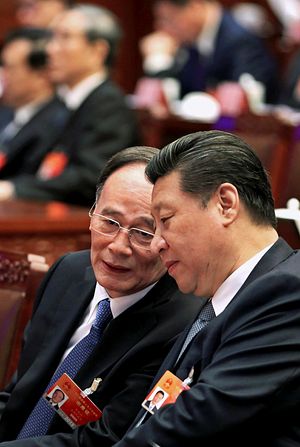Just under four years ago, at the 18th National Party Congress, Xi Jinping ascended to China’s top post, that of general secretary of the Communist Party of China (CPC). As the term of the 18th CPC Central Committee winds down – it will officially be replaced at the 19th Party Congress next fall – Xi took advantage of the body’s last plenary session to remind everyone of his top priority: weeding out corruption in the Party, with the related goal of increasing the accountability of all Party members to central leadership.
Both these themes were on full display at the recently concluded sixth plenum in Beijing, held from October 24 to 27. The stated theme was intra-Party governance, with the focus expected to be on institutionalizing Xi’s signature anti-corruption campaign through new Party rules.
To drive home its anti-corruption message, the plenum saw four former senior officials formally expelled from the Party, upholding previous recommendations to do so. The ousted leaders, Wang Min (former Party chief of Liaoning province), Lyu Xiwen (former deputy Party chief of Beijing), and military officials Fan Changmi and Niu Zhizhong, are just the latest to fall to Xi’s anti-corruption drive. Other notable ousters include Zhou Yongkang, the only former member of China’s all-powerful Politburo Standing Committee to face a corruption investigation; Ling Jihua, a close aide to former President Hu Jintao; and Guo Boxiong and Xu Caihou, both former generals and vice chairmen of the Central Military Commission.
ChinaFile’s “Catching Tigers and Files,” a tool for tracking the anti-corruption campaign, puts the total number of officials caught in the crackdown at over 1,800, including 182 “tigers” (officials ranked at or above the deputy provincial or deputy ministerial level). Of those, 1,130 officials (among them 139 “tigers”) have been arrested, expelled from the Party, and/or found already sentenced for corruption.
Yet despite the unprecedented number of investigations and arrests, one flaw remains: the intra-Party governance system is currently only as strong as the man in charge. Right now, that man is Wang Qishan, head of the Central Commission for Discipline Inspection (CCDI) and a noted political troubleshooter who ascended to the Politburo Standing Committee alongside Xi in 2012. Wang’s oversight is seen as crucial to the success of the campaign to date, but his age means he will likely be forced to retire at next year’s Party congress.
Keeping the campaign going without Wang will require at long last institutionalizing the system for overseeing Party discipline. That appears to have been the major goal of the sixth plenum, with two new documents approved at the meeting: an update to the 1980 “Rules on Intra-Party Political Life” and new “Regulations on Intra-Party Supervision” (in other words, how the Party oversees its members). Those documents themselves were not immediately released, but references in the communique provide some clues as to their content: an emphasis on preventing paid promotions; preventing family members from influencing or benefiting from official decisions; and promising “zero tolerance” for corruption at all levels. What specific mechanisms will be used to achieve these aims, however, remains unclear. One major step analysts will look for is the strengthening of the CCDI – and, particularly, its local branches – by allowing the body to operate independently of the leaders it is supposed to hold accountable.
As the Party defines it, the goal is to move from officials that “dare not” be corrupt to officials that “cannot” be corrupt, due to institutional checks on the abuse of power. According to Xinhua, this requires “a route from the initial shock-and-awe ousting of corrupt officials to perfecting the anti-graft regulations and mechanism.”
However, if the Party is above the law, who polices the Party? The communique is clear that the “Party controls the Party” – and that doing this well is the key to the country’s future. Thus Party discipline specifically, not the law, will be the mechanism for control. But coming up on 70 years since the founding of the People’s Republic, the CPC has yet to find a way to both keep its absolute control over the country and effectively police individual members.
Xi thinks he has found the answer: firm central control. “To maintain Party leadership [over the country] is first and foremost to maintain the Party Central Committee’s centralized, unified leadership,” the communique said. In other words, the CPC – and, by extension, China – can only persevere if the Central Committee, under Xi’s leadership, reigns supreme. In effect, this would make Xi and other top leaders the ultimate arbiters of Party discipline, in the form of the CCDI (and, by extension, Xi and company would be the only ones able to circumvent discipline as well).
This doesn’t deal, obviously, with question of what happens if the “core” itself is corrupt – or simply making a policy error. China learned all too well the danger of overreliance on one core leader during the Mao Zedong years. The sixth plenum communique tried to balance the line between firm central control and the problems of one-man rule. It both officially styled Xi as the Central Committee’s “core” and reiterated the CPC’s commitment to the style of collective leadership championed by Deng Xiaoping. It also made a point of denouncing “flattery” and “exaggeration, hiding the truth, or reporting only good news while holding back the bad,” according to Xinhua.
In its bid to stamp out corruption and strengthen intra-Party governance, the plenum communique tries to wed seemingly opposed ideas. It calls for Party governance that is “has both centralization and democracy, discipline and freedom, unified willpower and individual thought[…]” But then, the CPC has never had issues with proper-sounding rhetoric. We’ll have to wait until the release of the newly approved documents on Party life and governance to evaluate whether they have the necessary substance to overhaul the most powerful and largest organization in China: the Party itself.

































